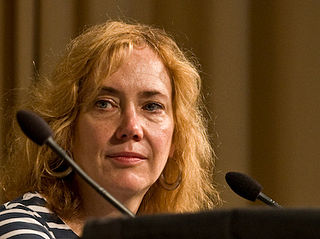A Quote by Jean M. Auel
Of the two, I would think of my work as closer to Science Fiction than Fantasy.
Related Quotes
Science fiction is fantasy about issues of science. Science fiction is a subset of fantasy. Fantasy predated it by several millennia. The '30s to the '50s were the golden age of science fiction - this was because, to a large degree, it was at this point that technology and science had exposed its potential without revealing the limitations.
I define science fiction as the art of the possible. Fantasy is the art of the impossible. Science fiction, again, is the history of ideas, and they're always ideas that work themselves out and become real and happen in the world. And fantasy comes along and says, 'We're going to break all the laws of physics.' ... Most people don't realize it, but the series of films which have made more money than any other series of films in the history of the universe is the James Bond series. They're all science fiction, too - romantic, adventurous, frivolous, fantastic science fiction!
I really wish that peoplewould just say, 'Yes, it's a comic. Yes, this is fantasy. Yes, this is Science Fiction,' and defend the genre instead of saying, 'Horror is a bit passe so this is Dark Fantasy,' and that' s playing someone else's game. So that's why I say I'm a fantasy writer and to hell with 'It doesn't read like what I think of as a fantasy'. In that case what you think of as a fantasy is not a fantasy. Or there is more to it than you think.
Science fiction is a weird category, because it's the only area of fiction I can think of where the story is not of primary importance. Science fiction tends to be more about the science, or the invention of the fantasy world, or the political allegory. When I left science fiction, I said "They're more interested in planets, and I'm interested in people."
'Filk' is the folk music of the science fiction and fantasy community - you get parodies, you get traditional music that's had the words slightly modified, and you'll also get just original works that have been written about science fiction and fantasy works, or with science fiction and fantasy themes.
A precondition for being a science fiction writer other than an interest in the future is that, an interest - at least an understanding of science, not necessarily a science degree but you must have a feeling for the science and its possibilities and its impossibilities, otherwise you're writing fantasy. Now, fantasy is also fine, but there is a distinction, although no one's ever been able to say just where the dividing lines come.
Being a fan of science fiction, I collect a lot of science fiction art work and so if you go to my house there's like a library and you just geek out on science fiction material. A lot of the colony worlds specifically are built as a melting pot of different societies, because the world is at a point where there are only two zones that are left inhabitable.
I have always been intensely uncomfortable with the idea of a science fiction writer as prophet. Not that there haven't been science fiction writers who think of themselves as having some sort of prophetic role, but when I think of that, I always think of H.G. Wells - he would think of what was going to happen, and he would imagine how it would happen, and then he would create a fiction to illustrate the idea that he'd had. And no part of my process has ever resembled that at all.
Much blood has also been spilled on the carpet in attempts to distinguish between science fiction and fantasy. I have suggested an operational definition: science fiction is something that COULD happen - but usually you wouldn't want it to. Fantasy is something that COULDN'T happen - though often you only wish that it could.



































